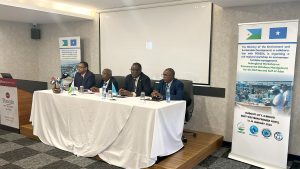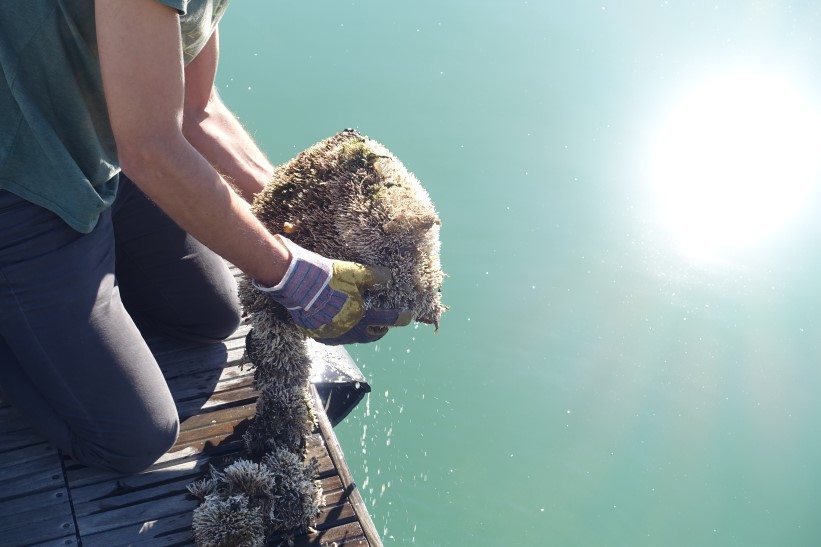PERSGA efforts to tackle the bio-fouling issue and to promote sustainable development of maritime activities in the region
Biofouling is described as the undesirable accumulation of microorganisms, algae, plants and animals on submerged structures (especially ships’ hulls). The introduction and establishment of Invasive Aquatic Species (IAS) is considered to be one of the greatest threats to the world’s freshwater, coastal and marine ecosystems.
The main vectors for unintentional transfer of invasive and non-indigenous species are ships’ ballast water and biofouling, and biofouling of marine platforms and aquaculture.
In order to address the long-term detrimental impacts of these invasive aquatic Species (IAS) on the unique and sensitive marine biodiversity of the Red Sea and Gulf of Aden, PERSGA is actively participating to the GloFouling Partnership project which is a partnership between the International Maritime Organization (IMO) the United Nations Development Programme (UNDP) and the Global Environment Facility (GEF) co assisted by the International Oceanographic Commission of UNESCO (IOC-UNESCO) and the World Ocean Council (WOC).
PERSGA was selected among other seven regional organizations to run this project for five years (2018-2023). The project is funded by the Global Environment Fund (GEF) for 6.9 Million $US. Four countries, namely: Jordan, Sudan, Djibouti and Somalia, from the Red Sea and Gulf of Aden Region participate in this project.
The overall objective of the GloFouling Partnership Project is to build capacity in developing countries for implementing the IMO Biofouling and other relevant guidelines for biofouling management and to catalyze overall reductions in the transboundary introduction of biofouling-mediated Invasive Aquatic Species (IAS) with additional benefits in the reduction of Greenhouse Gas emissions from global shipping.
The environmental threats and socioeconomic impacts that could be derived from the transfer of IAS can be summarized below.
Environmental threats:
- Damage to commercial and recreational fishery and aquaculture
- Modification of physical structures
- Alteration of overall habitat dynamics and fundamental changes in ecosystems
- Predation on and competition with native species
Socio economic impacts:
- Removal of natives’ species from recreational fishing areas (e.g parasite or viral infection). Threat to aquaculture operations by fouling structures , equipment
- Damage to coastal infrastructures (tourism, water cooling intakes and heat exchangers for power plants, desalination plants intake, etc). Reduce value of waterfront properties. Biofouling of commercial craft and standing/fixed structures
- Reduction in amenity value. Loss of tourist attractions (beach deterioration/change). Restricted access for coastal recreation. Bioturbation and erosion from burrowing fauna
- Removal of traditional food and recreational species. Collapse in biodiversity toward a monoculture habitat. Over-exploitation of primary productivity collapsing native food chains.
PERSGA works in close collaboration with IMO to implement activities related to biofouling management and the best practices for the maritime sectors which will occur in some of PERSGA countries to ensure that the benefits and lessons learnt from national experiences will be spread throughout the region.
Progress activities timeline 2019-2021
- The Regional Organization for the Conservation of the Environment of the Red Sea and Gulf of Aden has participated in the Kickoff meeting (Global task Force-1) of the GloFouling Partnership Project that was held in London during the Period 18-20/3/2019.
- From 11 to 12 November 2019 and in the port city of Aqaba –Jordan, PERSGA have jointly organized with the international Maritime Organization (IMO) and the Aqaba of Special Economic Zone authority (ASEZA) a national workshop hosted by the Jordan Maritime Commission (JMC). It aimed to raise awareness on biofouling as a pathway for non-indigenous species and discuss approaches on how biofouling should be controlled and managed to minimize the transfer of invasive aquatic species through ships’ hulls. Among the participants were representatives of various maritime sectors, including marina ports and civil society organizations.
- PERSGA has developed in 2020 a regional website (www.glofouling.persga.org) to provide information related to biofouling management, invasive aquatic species and any work related to the Project globally and within the region in particular. A video animation (narrated in Arabic) intended for public awareness has been set up to raise awareness about both topics (biofouling and IAS); this video would be listed up on the regional website.
At the onset, all global meetings roundtables and conferences would have been on-site, the Covid-19 pandemic outbreak prevented travels and that all activities were moved online as a result.
- In line of that and in response to the COVID-19 outbreak and consequent lockdown, PERSGA participated remotely to two global meetings held by teleconference by the GloFouling Partnerships’ Project Coordination Unit with the presence of Lead Partnering Countries (LPCs) and others Regional Coordinating Organizations (RCOs) to discuss impacts related to COVID-19 and the way forward. These two meeting held on May 11and October 29, 2020 aimed at evaluating impact of the lockdown on the overall delivery of the project’s activities, and get an update on the progress achieved so far by the PCU, the LPCs and the RCOs related to the implementation of the GloFouling Partnerships project.
- PERSGA has also attended series of online webinars held by the GloFouling Partnerships’ Project Coordination Unit as part of the consistent implementation of the GloFouling partnership project.
- PERSGA’s participation in a virtual webinar on the ” Risk of dissemination of the nonindigenous Orange cup coral from ship hulls and oil/gas platforms in the South West Atlantic ” on September 10, 2020. The webinar aimed at introducing the participants effective alternatives for the control and management of this non-indigenous species in natural and artificial substrates.
- PERSGA’s participation in the online webinar on “An update on the review of the Biofouling Guidelines 2011, on October 22, 2020. It aimed to provide some insights on the progress of the review process currently taking place at IMO. This guide provides a globally consistent approach to the management of biofouling and are a decisive step forward towards reducing the risk related to the transfer of invasive aquatic species.
- PERSGA’s participation in a virtual webinar entitled ” BioPass – end to end biofouling management across the lifecycle of the asset ” on March 15, 2021 which aimed to present a study that was carried out on the application of distributed ledger technology to enable the global implementation of the IMO Biofouling Guidelines. Born in the cloud and powered by blockchain, BioPass technology connects relevant stakeholders involved in the biofouling management lifecycle to a common information record in real time asynchronous environment for fast, effective, compliant biofouling management.
- PERSGA has participated in a virtual seminar entitled “Raising the bar in-water cleaning” held on March 5, 2021 which aimed to present a publication on the first industry standard on in-water cleaning of ships developed by BIMCO and the International Chamber of Shipping (ICS) which was published in January 2021, to help and to provide clarity and quality assurance to ship-owners, ports, and government authorities to combat the problem of transfer invasive species to local marine environments while the ship is in the water.
These recorded online webinars are also found on the glofouling website (www.glofouling.imo.org)
- Coordination is underway to hold a virtual regional seminar on the biofouling management and the invasive aquatic species, which is scheduled to be held remotely on June 17, 2021.
- Coordination is also underway with the Project coordination Unit of the Glofouling Partnerships Project to implement 3 national activities in the Hashemite Kingdom of Jordan, the Lead Partnering country of this project.
More to find
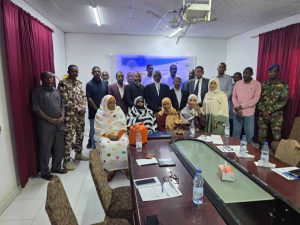
National Training Workshop on “Collection and Management of Fisheries Statistics …
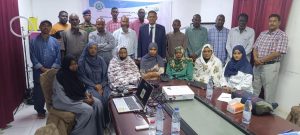
PERSGA Concludes National RIMS Training Workshop in Sudan
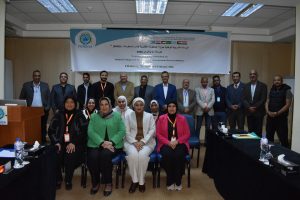
PERSGA Successfully Conducts National Training Workshop on Regional Information Management …
